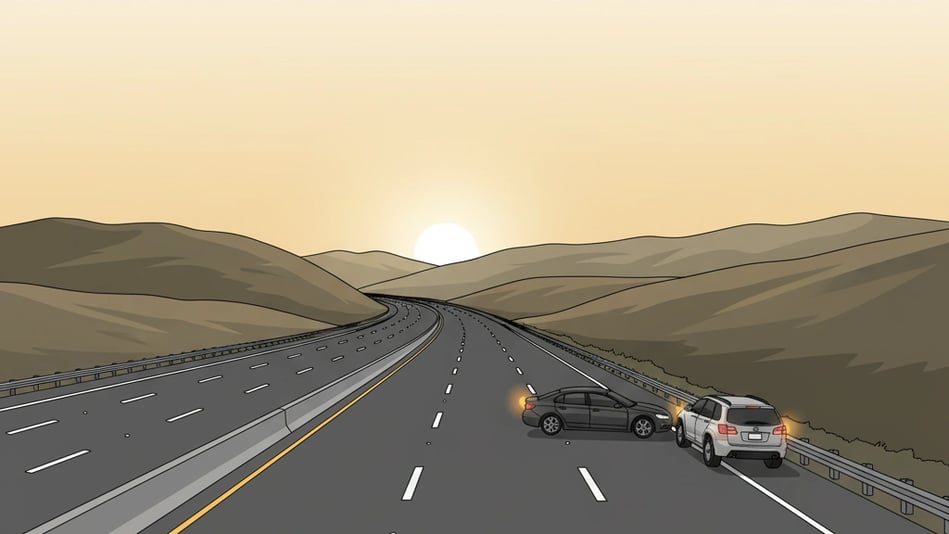Jury Awards $409K to Driver Injured in Contra Costa Crash

Table of Contents
Case Background
This lawsuit grew out of a traffic collision that took place on May 6, 2019, on the Bollinger Canyon Overpass along Interstate 680 in San Ramon, California. Plaintiff Adrian Leyva said that a vehicle driven by Steven Rowsey struck his vehicle and left him with painful injuries. The complaint explained that Steven drove the car, Kerry Blessing owned and also operated it, and Eric Rowsey owned and entrusted it to Steven and Blessing.
Leyva filed his complaint on May 5, 2021, in the Superior Court of Contra Costa County. He sued for negligence and motor-vehicle liability and asked for compensation for medical expenses, pain, emotional distress, and long-term effects from the crash.
The Defendants denied all wrongdoing. Eric and Steven Rowsey filed a formal answer rejecting each allegation. They argued that Leyva contributed to the crash, failed to reduce his own damages, and blamed unnamed third parties for the incident. The case moved through discovery, then headed to trial. A jury heard evidence starting October 14, 2025, and returned its verdict on October 29, 2025.
Cause
Leyva stated that Steven Rowsey’s negligent driving caused the collision. According to the complaint, Steven operated the vehicle in an unsafe manner, and his conduct led directly to the crash. Leyva argued that the Rowsey Defendants and Blessing created additional liability because they owned, permitted, and entrusted the vehicle to Steven.
The complaint presented a straightforward timeline: Steven drove the car on Interstate 680, struck Leyva’s vehicle, and caused physical and emotional harm. Leyva said the crash forced him to seek medical treatment, miss work, and endure lasting pain.
Injury
Leyva claimed multiple physical injuries. He described severe pain, restricted movement, and the need for medical care following the crash. He said the collision caused physical impairment, emotional distress, and a loss of enjoyment of life. His medical treatment included doctor visits, diagnostic testing, and therapy connected to his injuries.
The verdict later confirmed that the jury believed he suffered both economic and noneconomic losses. Jurors awarded compensation for medical expenses, pain, emotional distress, and long-term effects of the collision.
Damages Sought
Leyva asked for compensatory damages for all losses caused by the crash. His complaint listed medical bills, lost wages, property damage, and loss of earning capacity. He also sought general damages, including physical pain and emotional suffering. He did not ask for a specific number but requested an amount proven at trial.
During trial, Leyva focused on medical costs already paid, future medical needs, and significant emotional harm. The jury weighed those requests when deciding the final award.
Key Arguments and Proceedings
Legal Representation
Plaintiff: Adrian Leyva
· Counsel for Plaintiff: Pamela R. Abella | Bond Legal Irvine
· Experts for Plaintiff: Vijay Gupta | Sherwin Hua | Bradley Jabour
Defendants: Steven Rowsey | Eric Rowsey | Kerry Blessing
· Counsel for Defendants: Edgar W. Hawkyard | Jeanette N. Little & Associates, Pleasanton
· Experts for Defendants: Jeffrey Yablon | William Hoddick
Claims
Motor Vehicle Negligence
Leyva stated that Steven operated the vehicle carelessly and failed to maintain safe control. He said Steven’s conduct directly caused the collision. He also argued that the owners shared responsibility because they permitted the vehicle’s use.
General Negligence
Leyva included a separate negligence claim, arguing that the Defendants owned, maintained, and entrusted the vehicle in a way that created unreasonable danger. He said they failed to use reasonable care. According to the complaint, their conduct exposed him to foreseeable harm.
Owner Liability and Entrustment
Leyva claimed that both Eric Rowsey and Kerry Blessing owned or co-owned the vehicle and permitted Steven to drive it. Because of that permission and entrustment, Leyva argued they were legally responsible for the harm caused by the crash.
Defense
Comparative Negligence
The Defendants argued that Leyva contributed to the collision. They said a reasonably careful driver would have acted differently and avoided or reduced the crash. If the jury believed Leyva shared any fault, the law required his damages to be reduced.
Failure to State a Cause of Action
The answer argued that the complaint did not include enough factual detail to support the claims. The defense said Leyva’s legal theories were not properly supported.
Apportionment of Fault
The defense argued that other unknown people may have caused or contributed to the crash. They told the jury that if any fault existed, it should be divided among all responsible people, not only the Rowsey Defendants or Blessing.
Failure to Mitigate
The Defendants also argued that if Leyva suffered damages, he made them worse by failing to take reasonable steps after the crash. They said this failure should reduce the amount of damages he could recover.
Jury Verdict
The jury considered the central question: whether Steven Rowsey’s negligence was a substantial factor in causing harm to Leyva. The jury answered yes.
They then awarded damages as follows:
Past medical expenses: $8,200
Future medical expenses: $171,000
Past noneconomic damages: $210,000
Future noneconomic damages: $20,000
The total award came to $409,200.
The verdict held Steven responsible for the harm and reflected the jury’s conclusion that the crash caused meaningful physical and emotional consequences for Leyva. The jury signed and dated the verdict on October 29, 2025, and returned it in open Court.